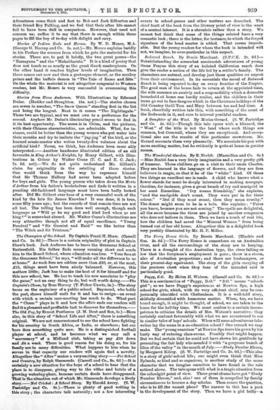The Champion of the &hoof. By Captain Frank H. Shaw.
(Cassell and Co. 3s. ed.)—There is a certain originality of plot in Captain Shaw's book. Jack Ambrose has to leave the Grammar School at 13attersfield. His father finds money running short and sends him to the Board School, where education was free. " Your fees at the Grammar School," he says, "willmake all the difference to us athome." As such fees are seldom more than £10, or, at the most, £15, things must have been nicely balanced. However, this matters little; Jack has to make the best of it for himself and for this new school, too. He has to teach his new associates to "play the game," not an easy thing to do, but well worth doing.—The Captain's Chum, by Ross Hervey (T. Fisher Hnwin, 5s.)—The story turns on the captaincy of a public school. Raymond, who holds the post, shows himself unfit for it and has to resign—an event with which a certain race-meeting has much to do. What part the " Chum " plays in it and how the affair ends our readers will fmd it apleazant andprofitable task to discover for themselves.— The Old Fag,by Ernest Protheroe (J. M. Dent and Son, 5s.)—Here also, in this story of "School Life and After," there is something original. We are not =accustomed to see the school hero fighting for his country in South Africa, or India, or elsewhere; but our hero does something quite new. He is a distinguished football player at school, and he becomes what we may call a "mercenary" of a Indiana club, taking as pay £10 down and £4 a week. There is good reason for his doing so, for his family are in many difficulties. What happens to him when he serves in that capacity our readers -will again find a novelty. Altogether the " After" makes a veryexciting story.—For School and Country, by Ralph Simmonds. {Cassell and Co., 3s. 6d.)—It is certainly a new situation for the boys of a school to hear that the place is to disappear, giving way to the villas and hotels of a growing watering-place, because certain deeds have disappeared. That is the situation out of -which Mr. Simmonds develops a lively story.—Not Cricket : A School Story. By Harold Avery. (S. W. Partridge and Co. 5s.)—There is plenty of good writing in this story ; the characters talk naturally; not a few interesting events in school games and other matters are described. The chief fault of the book from the literary point of view is the want of a central interest. It is a chronicle rather than a story. We cannot but think that some of the things related have a very romantic look ; there is the letter, for instance, to which the forged signature of the head master is added. That seems improb- able. But the young readers for whom the book is intended will not, we imagine, be ever-particular in this respect.


































































 Previous page
Previous page